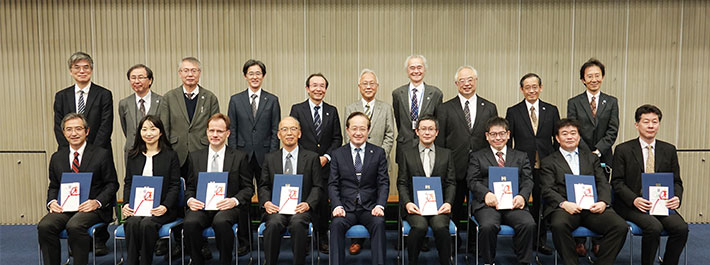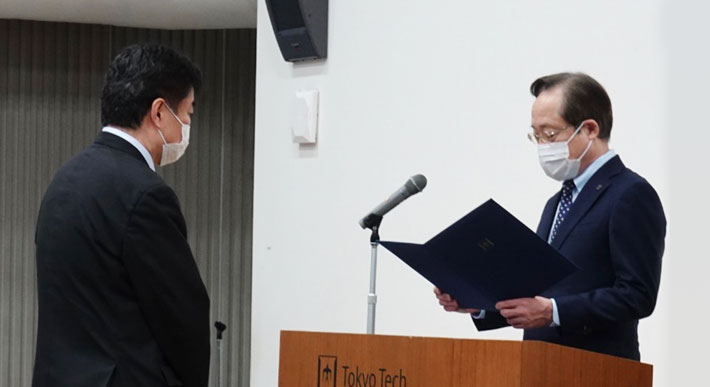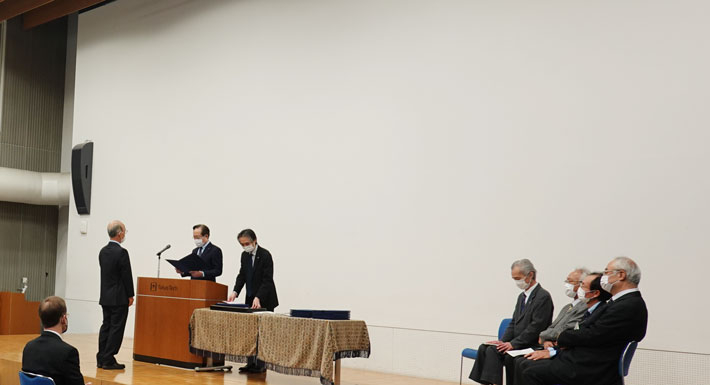Recipients of the Best Teacher Award for academic year 2020 received their certificates and stipends from President Kazuya Masu at a ceremony on Ookayama Campus on December 10, 2021. This was the 19th time for the Institute to recognize promoters of outstanding education for their enhanced teaching methods and educational skills with this award.

AY2020 Best Teacher Award recipients with President Masu (front, center) and executive vice presidents, deans
This year, six individual awards and three group awards were presented to a total of 15 Tokyo Tech faculty members. School of Materials and Chemical Technology Associate Professor Gen-ichi Konishi and Global Scientific Information and Computing Center (GSIC) Professor Shin-ya Nishizaki received the top accolades.
The recipients of the academic year 2020 Best Teacher Award are as follows.
Best Teacher Award – Highest award for excellence
Gen-ichi Konishi, Associate Professor, School of Materials and Chemical Technology
For his five-year initiative to develop cultured, globally-minded individuals through exchange between students and musicians
Together with the public relations committee of the three engineering Schools, Konishi launched in 2015 the Tokyo Tech Concert Series to promote the philosophy of education reform and to demonstrate that Tokyo Tech is not only a hub of advanced science and technology, but also a source of blossoming art. The purpose of the initiative was to cultivate among students a sense of culture and global-mindedness through exchanges with musicians at home and abroad, for example via a master class with the principal flutist of the Vienna Philharmonic Orchestra, and through the planning and management of concerts. This project has led to continued exchanges even after students have graduated, and many of these alumni remain active in music.

Assoc. Prof. Konishi (left) receiving his award
Shin-ya Nishizaki, Professor, Global Scientific Information and Computing Center (GSIC)
For his efforts in constructing a support system for students taking online classes
From April 2020 to the present, Nishizaki has made a number of significant contributions to the establishment of a support system for students taking online classes. He conducted a survey for new students regarding information infrastructure, and prepared a Zoom lecture manual for new students to ensure the smooth implementation of online learning via Zoom, which was required due to the spread of COVID-19. Nishizaki also opened and operated a Zoom support desk and information support desk for new students.
Best Teacher Award – Award for excellence
Tetsuo Okada, Professor, School of Science
For his efforts in providing education in analytical chemistry unbound by conventional frameworks but clearly positioned in the broader realm of chemistry
Education in analytical chemistry often consists of theories on solution equilibria and instrumental analysis, but their significance and position within the broader framework of chemistry has not always been clear. While keeping to content that students majoring in chemistry are expected to know, Okada continues to develop analytical chemistry education methods that help clarify this significance by providing a broader understanding of the entirety of analytical methods designed to elucidate the target chemistry rather than focusing on details of individual measurement methods. Okada has shown that while newly developed instruments may have simplified measurement methods, it is often necessary to apply an analytical chemistry perspective and train of thought.

Prof. Okada receiving his award
Tamas Kalman, Associate Professor, School of Science
For his efforts in introducing oral examinations that assess performance during the COVID-19 pandemic
To enhance individual interaction, which drastically decreased during COVID-19, Kalman introduced a 45-minute oral examination held individually with each student instead of a written examination. This allowed him to assess students' preparation and comprehension, and required the students to study every aspect of the material thoroughly to achieve good results. Through these oral examinations, which have a long tradition in Europe, students not only gained a more detailed understanding of mathematical theory, but also boost their own confidence regarding mathematical concepts.
Yusuke Nishida, Associate Professor, School of Science
For his efforts in providing interactive, real-time online lectures and opportunities for immediate reflection
During the Electromagnetism I and II lectures, Nishida offered real-time writing and notetaking on an iPad notebook application in much the same way as on a blackboard, which was then shown to students via screen sharing for easy understanding. Report assignments were also given immediately at the end of each unit to provide students with opportunities to reflect on the contents in a timely manner. This allowed students to naturally maintain an appropriate pace of study even during online lectures when they were confined to their homes.
Kenji Kise, Professor, School of Computing (representative)
Jun Miyazaki, Professor, School of Computing
Yoshitaka Arahori, Assistant Professor, School of Computing
Hieu Hanh Le, Assistant Professor, School of Computing
For their efforts in developing and implementing an online method for teaching hardware-related classes in information technology
The team, led by Kise, established the Adaptive Computing Research Initiative (ACRi), and designed and operated the ACRi Room which provides an environment for field programmable gate array use and learning opportunities in collaboration with industry partners. The ACRi room, a so-called virtual computer room, allowed the team to redesign lectures related to hardware for information engineering while taking advantage of the online system. This enabled smooth lectures on logic circuit theory, computer logic design, and computer architecture at times when in-person classes are difficult.
Junko Sanada, Associate Professor, School of Environment and Society
For her efforts in fostering next-generation professionals through primitive, leading-edge stone walling
Sanada shone a fresh light on stone walling, a sustainable construction method with low environmental impact that was largely forgotten in the process of modernization of civil engineering technology after the Meiji era. She shared her knowledge with students through lectures on creation processes in science and technology, the history of civil engineering, and stone walling workshops. By allowing students to experience and better understand stone walling, Sanada provided an opportunity to think more deeply sustainable development, including the state of civil engineering technology, the evaluation of technology and the values behind it, and the ideal direction of technological evolution.
Reiko Sato, Associate Professor, Institute for Liberal Arts (representative)
Junko Morita, Associate Professor, Institute for Liberal Arts
For their efforts in utilizing extracurricular activities, and developing and managing Tokyo Tech's preparatory Japanese language education before students' admission to the bachelor's degree program
For the past 20 years, Tokyo Tech has been providing Japanese language preparatory courses to international students from Korea before they enter the bachelor's degree program. Through an integration of students' specializations, the Japanese language, and extracurricular activities such as monotsukuri training, chemistry experiments, lab visits, and off-campus trips, the program allows students to experience university studies and learn natural Japanese outside the classroom and through physical activities. This team has helped international students experience and understand Japanese society and culture, grasp the essence of Tokyo Tech education and research, and bring international and Japanese students together in a shared, comfortable environment of learning.
Masao Murota, Professor, Institute for Liberal Arts (representative)
Tamio Nakano, Professor, Institute for Liberal Arts
Takehiko Tanioka, Professor, Institute for Liberal Arts
For their efforts in successfully planning and implementing the Risshi Seminar in collaboration with the Tokyo Tech Alumni Association
This team from the Institute for Liberal Arts has been integral in executing the Risshi Seminar in collaboration with the Tokyo branch of the Tokyo Tech Alumni Association since 2017. At the Risshi Seminar, conducted four times a year, alumni of Tokyo Tech engaged in unique activities provide lectures, after which seminar participants split into small discussion groups. These groups always include both current students and graduates. The seminar lecturers and other participating alumni act as good role models for current students, and provide them with a strengthened sense of belonging in the broader Tokyo Tech community.
. Any information published on this site will be valid in relation to Science Tokyo.





